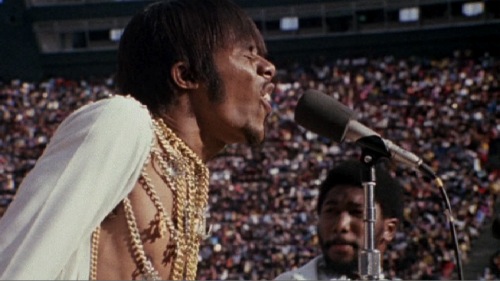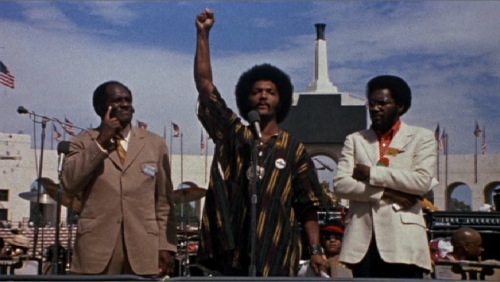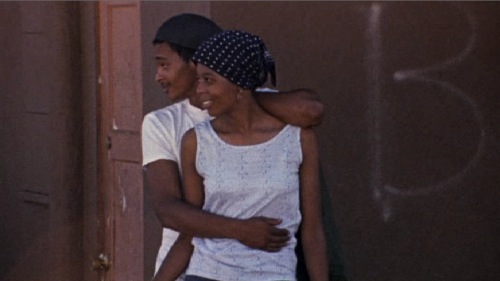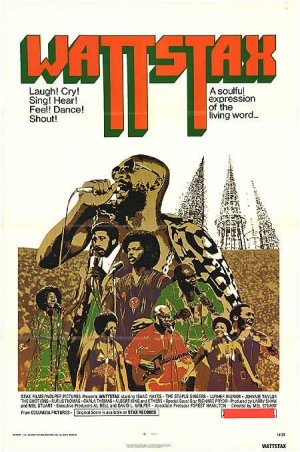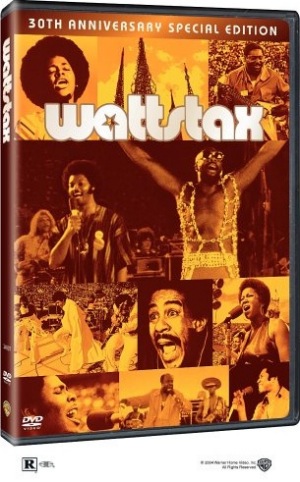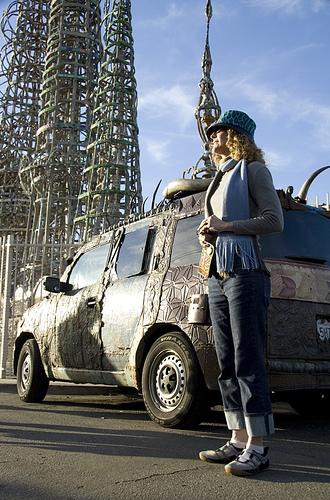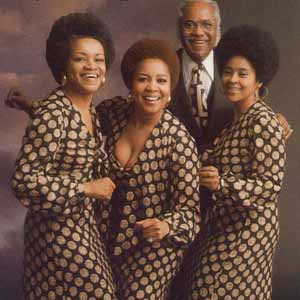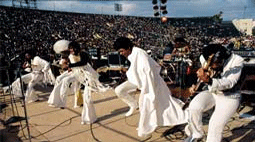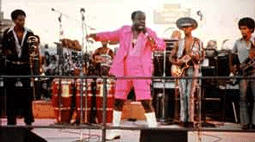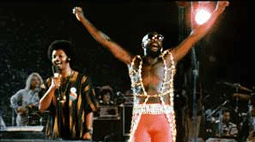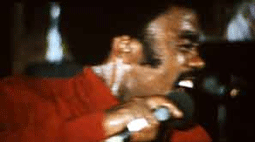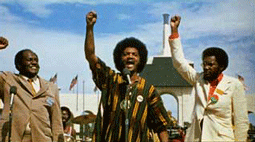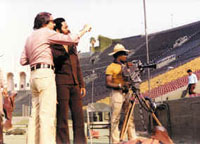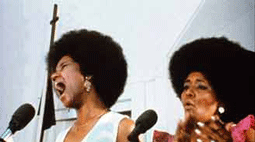 | Wattstax- Black Woodstock, The Watts Summer Festival runs August 9-11 |
|
|
|
|
|
|
|
|
|
Music Icon Isaac Hayes was a devout Scientologist - http://threebrothersandasister.blogspot.com/2008/08/todays-isaac-hayes-memorial-becomes.html |
The Staple Singers |
The Bar-Kays - more photos of Wattstax - http://www.wattstax.com/pressroom/photothumb.html |
|
Rufus Thomas |
Albert King |
Jesse Jackson, Isaac Hayes |
|
Johnnie Taylor |
Schlitz Beer Rep (l),Jesse Jackson (c), |
Richard Pryor |
|
|
The Emotions |
L.A. Coliseum |
Wattstax (1973)
Directed by Mel Stuart
Synopsis
Sunday, August 20, 1972. Memphis-based Stax Records descended on the L.A. Coliseum with most of their recording roster Ė Isaac Hayes, The Staple Singers, The Bar-Kays, Rufus Thomas and many more Ė for an eight hour concert to benefit the annual Watts Summer Festival, the observation of the ďrebellionĒ that burned through the community only seven years previous, claiming 34 lives. Passing through the turnstiles were 112,000 people, the largest assembly of African Americans at a non-civil rights event up to that point in history. To record the day, Stax contracted award winning documentary producer David Wolper, and under the direction of Mel Stuart, supplemented the groundbreaking concert with ďman on the streetĒ interviews with the people of South Central L.A. and staged performances in the community. Narrating the film and providing his own commentary was a rising comedian named Richard Pryor.
Production history
In the early 1970s, a record company in Tennessee was looking to expand. Cinematographer Larry Clark recalled, ďStax Records Ė you know Ė they came out of Memphis and they were kind of like this underground company. They didnít have the same kind of promotional machine that other record companies had like Motown. But people did identify with the type of music that Stax was putting out there. They could identify with it culturally. Motown was more crossover, whereas Stax was really that down home kind of sound. The mindset of the African American community across the country had changed and we were at that place where Stax Records was. People were lookiní more towards the African roots, more towards our musical roots. Thatís just where we were politically, culturally.Ē
Concert promoter Forest Hamilton was in Los Angeles to establish a film division Ė Stax West Ė when he met writer Richard Dedeaux. Hamiltonís collaboration with Dedeaux on a movie script produced the idea of a benefit concert. Stax president Al Bell seized on donating the proceeds to the Watts Summer Festival, observing the anniversary of the ďrebellionĒ Ė as it was known in the community Ė that ignited in the summer of 1965. Most of Staxís recording roster signed on to perform for free and Bell booked the Los Angeles Coliseum. Stax underwrote most of the expenses and Schlitz Brewing Company stepped up as sponsor. With tickets going for $1, the 90,000-seat arena Ė home field of the Los Angeles Rams Ė completely sold out. Wattstax was on its way to becoming the biggest assembly of African Americans ever in one place for a non-civil rights event.
Al Bell recalled, ďAs it evolved though, the idea emerged, well, you know, when we pull this off, weíll have pulled something off that hasnít been done before, but we really ought to consider doing a documentary. Well, then if we do a documentary, what kind of documentary should it be? Well, it should be about something that demonstrates to the world that the music that we sing is a reflection of what goes on in our lives and in our lifestyle. We gotta pull that off. I told Forest, ĎI want to go and find out who the finest documentary producer is in Hollywood.í We want the very best. And he came back and said: ĎDavid Wolper.íĒ The contract between Stax and Wolper gave the producer creative control, with one major exception: Stax retained the right of approval on content relating to Black relationships or feeling, as well as the narration and music contained in the picture.
A budget of $480,000 was set. To direct, New Yorker Mel Stuart was brought into the project. ďI got involved with Wattstax because I had done many films for Dave Wolper. I had just finished directing Willy Wonka and the Chocolate Factory and was at liberty. I had some mixed feelings, because I felt I wasnít that familiar with the Black experience, so this was the condition. I met the staff of Stax: Larry Shaw (who became co-producer of the picture with me), Forest Hamilton and others and said, this is the way I want to do it. I am the only White person on the creative staff. Everything will be siphoned through your feelings, Ďcause I donít know enough about the Black experience. I can interpret it, but I donít know it.Ē
Isaac Hayes recalled, ďI thought about the commemoration of what happened, with the Watts riots. We were not celebrating the devastation that went on there. We were commemorating lives that were lost and the coming together of a people that had been suppressed. Thatís why all the violence broke out. We were suppressed. You know, police brutality, all those things added up. All that pent up frustration from a people, it just came out. So, somebody struck a match. I donít know how it started. But I think the society we were liviní in bred that, gave rise to it. You know, you can suppress a person for so long and they will rise up.Ē To keep tensions cool, Al Bell lobbied the city to keep the LAPD out of the stadium. Security was all Black and was not permitted to carry firearms. With an estimated 112,000 turning out for the eight-hour concert, no violent incidents were reported.
Columbia Pictures agreed to distribute Wattstax and held a world premiere February 1973 in Los Angeles. The film climaxed with Isaac Hayes performing his monumental hit ďTheme From ShaftĒ, and ďSoulsvilleĒ, songs from the movie Shaft. MGM immediately filed a lawsuit. In order for Hayes to appear in the movie at all, he was called back to pen a new song Ė ďRolling Down the MountainsideĒ Ė and lip synch it on a soundstage, as if it had been performed at Wattstax. The original ending was buried for 30 years. Hayes recalled, ďI was angry. I was angry at MGM. Why would they do that? Makiní moneyís one thing, monetarily speaking, but it would have been a contribution to allow that to go just like it was, Ďcause it meant so much to so many people. It was insensitive of them to do that. But Ė you know Ė they had control of it. So I donít know who made that decision, I donít know if attorneys or what. Again, they were representing that same kind of suppression that caused them riots in the first place. Itís always a struggle.Ē
Wattstax was generally dismissed in the mainstream press. Vincent Canby, the New York Times: ďI donít mean that the film is in any way fake; it just has the air of something too carefully laid out in advance. Itís so busy being glossy and optimistic that it doesnít even allow its performers time to create on screen a measure of the excitement they might have created in person.Ē Though Wattstax was invited to open the Cannes Film Festival in May 1973 and according to Stuart ďdid very well in Black neighborhoodsĒ, within a year, the film was a memory. An arcane financing deal dividing the filmís rights between Columbia and Fantasy Inc. Ė the record label that purchased much of the Stax library in 1977 Ė prevented Wattstax from being broadcast on TV or released on VHS. For decades, Wattstax practically disappeared.
In 2001, film restoration expert Tom Christopher was on the Warner Bros. lot working on a directorís cut of Amadeus. He stumbled into a palette of boxes that hadnít even been checked into the film storage facility and discovered the original 16mm negative of Wattstax. After some investigating, Christopher also tracked down the missing ending. Fantasy Inc. joined with Columbia and Warner Bros. to restore Wattstax to its original theatrical condition, cleaning the negative and remastering the soundtrack. A 35mm print of Wattstax: The Special Edition screened at the 2003 Sundance Film Festival and was re-released in 12 theaters that June. A long overdue DVD emerged later that year. Fantasy facility manager Scott Roberts commented, ďWe realized that the performances were really brilliant and quite a cultural find. So we coordinated with Warner Brothers and Columbia to get the film seen by the public as it was originally intended. The feedback we get is that itís an important cultural document for African-Americans. It was a major event.Ē
Opinion
To get an idea of how epic the lineup of performers assembled at the L.A. Coliseum in August 1972 was, Isaac Hayes is nearly blown off the stage twice; first by cosmic bad assedness of The Bar-Kays laying down ďSon of ShaftĒ and later in the afternoon, Rufus Thomas Ė the worldís oldest teenager Ė busting out ďThe BreakdownĒ and ďFunky ChickenĒ and having enough energy left to coax hundreds of festival goers off the football field and back into the stands. Itís one hell of a show, but what makes Wattstax one of the top five concert films of all time is how poetically it weaves the music into the real world of the community surrounding the venue. Interspersed between the delicious drum beats and funky rhythm guitars, the filmmakers give the people a voice. Opening up about their experiences Ė hopes, fears, relationships Ė is more even more powerful than what takes place on the stage.
Wattstax 1973
Wattstax - The Special Edition:
ďLoud and proudĒ By James Maycock.
On the set of Wattstax are director/producer Mel Stuart
''Wattstax'' back: Forgotten film
